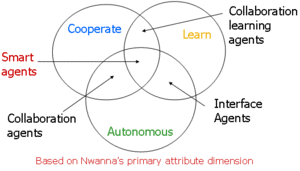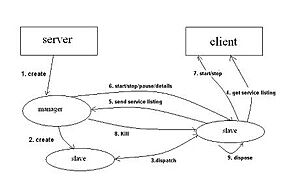Software agent facts for kids
A software agent is like a smart computer program that works on its own to help you or another program. Think of it as a digital assistant! The word "agent" comes from a Latin word meaning "to do," so it's a program that acts on your behalf.
Some software agents are also called "bots," which is short for "robots." They can be part of a physical robot, or they can be just software on a computer or phone, like Siri on an iPhone. Software agents can work by themselves or team up with other agents or even people. When they interact with people, like chatbots, they might understand human language or have a personality.
There are different kinds of agents. Some are "intelligent agents" that can think and make decisions, like a mini-brain. "Autonomous agents" can change how they do things to reach their goals. "Distributed agents" run on different computers but work together. "Multi-agent systems" are groups of these distributed agents working as a team to solve big problems. "Mobile agents" can even move from one computer to another while they are working!
Contents
What Software Agents Do
Software agents have special qualities that make them different from regular computer programs. They are not just told what to do once; they can decide when to act.
Here are some key things agents do:
- They don't wait to be told to start; they can begin tasks on their own.
- They can wait quietly on a computer, watching for certain things to happen.
- When the right conditions appear, they start working.
- They don't always need a person to tell them what to do.
- They can start other tasks, including talking to other programs.
An agent is a powerful way to describe a complex program that can act somewhat independently. It works to complete tasks for its user. Unlike simple computer "objects" that are defined by what they contain, an agent is defined by how it behaves.
Many experts describe agents with these ideas:
- Persistence: The agent's code runs all the time. It decides for itself when to do something.
- Autonomy: Agents can choose tasks, decide what's most important, and make decisions without a person's help.
- Social ability: Agents can talk and work with other computer programs. They can even team up on a task.
- Reactivity: Agents can sense what's happening around them and react to it in the right way.
Agents vs. Regular Programs
All agents are programs, but not all programs are agents. What makes agents special? They react to their environment, act on their own, aim for goals, and keep working over time.
Agents vs. Objects
Agents are more independent than simple computer "objects." Agents can behave in flexible ways: they can react to things, start actions on their own, and work with others. They also have at least one "thread of control," meaning they can do things at the same time.
Agents vs. Expert Systems
Expert systems are programs that use rules to make decisions, like a doctor's assistant. But they are not connected to their environment. They don't react to changes or work with other systems like agents do.
How Software Agents Help Us
Software agents can be very helpful by doing tasks that are complicated or repeated often. They can make work easier and faster for people.
Making Work Easier
People often enjoy doing simple tasks that give a feeling of success. But repeating the same simple task over and over can be boring. Software agents can take over these routine tasks. This frees up people to focus on more interesting and important parts of their work. Agents can help people feel more satisfied with their jobs.
Things to Think About
While agents are great, there are a few things to consider. Some people might not feel comfortable letting a computer program handle important tasks completely. Also, if people rely too much on agents, they might lose some skills, like finding information themselves.
For an agent to help you, it needs to know a lot about you, like your preferences. This means there could be privacy concerns. If users start talking more with their agents, especially for communication, they might spend less time talking with other people. These are things that people who design and use agents think about.
Agent History
The idea of an agent started a long time ago with something called the "Actor Model" in 1977. This model described a self-contained program that could interact and run at the same time.
Software agent systems grew from "Multi-Agent Systems" (MAS). These MAS systems came from ideas in Distributed Artificial Intelligence, where many computer brains work together.
In 1987, a video called "Knowledge Navigator" showed a vision of how people and agents could work together. Since the 1990s, many types of agents have been created, including those used on the internet and in search engines.
Examples of Smart Software Agents
Software agents are all around us! Here are some common types:
Shopping Bots
These agents travel around the internet to find information about products and services. They are also called "shopping bots." They are great for finding the best prices on things like CDs, books, or electronics. They also help with online payments.
Personal Agents
Personal agents are smart agents that act on your behalf. They can do many helpful things for you:
- Check your email, sort it, and tell you when important messages arrive.
- Play computer games as your opponent.
- Create personalized news reports just for you, like some versions of CNN.
- Find information on topics you choose.
- Automatically fill out forms on websites for you.
- Scan web pages and highlight the most important parts.
- Help you with online job searches by finding opportunities and sending your resume.
- Keep your profiles updated across different social media sites.
Monitoring Agents
Monitoring agents watch and report on equipment, often computer systems. They can track how much inventory a company has, watch competitors' prices, or look for unusual activity in the stock market.
For example, NASA's Jet Propulsion Laboratory uses an agent to keep track of supplies. It helps plan equipment orders to save money and manages food storage. These agents often monitor large computer networks, keeping track of every computer connected.
A special type of monitoring agent helps make decisions during important operations. They watch the status of resources like ammunition or transport vehicles. They receive goals from higher-level agents and then work to achieve those goals using the available resources, trying to use as little as possible while getting the job done.
Data-Mining Agents
These agents use computer technology to find trends and patterns in huge amounts of information from many different places. You can use this information to find what you are looking for.
A data mining agent works in a "data warehouse," which is like a giant storage place for information from many sources. "Data mining" is the process of looking through this warehouse to find useful information. For example, it might find ways to increase sales or keep customers.
One common type of data mining is "classification." This finds patterns in information and puts them into different groups. Data mining agents can also spot big changes in trends or new information and alert you. For instance, an agent might notice a slowdown in the construction industry. Based on this, construction companies could make smart choices about hiring or buying equipment.
Networking Agents
Other examples of smart agents include some spam filters that block unwanted emails, game bots that play games, and tools that monitor computer servers. Search engine indexing bots, which help search engines find and organize websites, are also intelligent agents.
- User agents help you browse the internet.
- Mail transfer agents help with email, like Microsoft Outlook. They talk to mail servers so you don't have to understand the technical commands. They can even filter your mail.
- SNMP agents help manage computer networks.
- In Unix systems, httpd is an HTTP daemon that helps run websites.
- Management agents manage telecom devices.
- Wireless beaconing agents are simple programs that help with things like wireless locks.
Software Development Agents
Software bots are becoming very important in creating and improving other software.
Security Agents
Agents are also used in computer security to check and act on different types of content. Examples include:
- Data Loss Prevention (DLP) Agents: These agents watch what users do on a computer or network. They compare actions to rules about what is allowed and then take action, like allowing, warning, or blocking something.
- Endpoint Detection and Response (EDR) Agents: These agents monitor everything happening on a computer to find and stop harmful activities.
- Cloud Access Security Broker (CASB) Agents: Similar to DLP agents, but they focus on traffic going to cloud applications.
Designing Software Agents
When creating agent-based systems, developers think about several things:
- How tasks are planned and kept in sync.
- How agents decide which tasks are most important.
- How agents can work together or find resources.
- How agents can be moved to different computer environments.
- How agents sense their surroundings and change their behavior when the environment changes.
- How agents send messages and talk to each other.
- What types of agent groups are useful, like agents for tasks or for scheduling.
For software agents to work well together, they need to understand the meaning of each other's data. This can happen if computer systems share information about their data.
An agent works by looking for information in local and remote databases. It might get news updates or search the web. The agent then uses its searching or language skills to find important words or patterns in the information. This new information is then sent to the agent's "brain" to decide what to do. The agent combines this new information with rules or knowledge it already has. If it finds something important, the agent might do a more detailed search. Finally, the agent might decide to take an action, like telling you that something important has happened. If you act quickly on the notification, the agent might learn that this type of event is important and give it more weight in the future.
Bots can be created to do good things or bad things. To show that a bot is designed with good intentions, it should identify itself when it talks to a website. Its computer address should also be checked to prove it's legitimate. Also, a good bot should always follow a website's `robots.txt` file, which tells bots what they can and cannot do on the site. And like respecting `robots.txt`, bots should not be too aggressive and should follow any instructions about how fast they can access a site.
See also
 In Spanish: Agente (software) para niños
In Spanish: Agente (software) para niños
- Agent architecture
- Chatbot
- Data loss prevention
- Endpoint detection and response
- Software bot
 | Shirley Ann Jackson |
 | Garett Morgan |
 | J. Ernest Wilkins Jr. |
 | Elijah McCoy |



